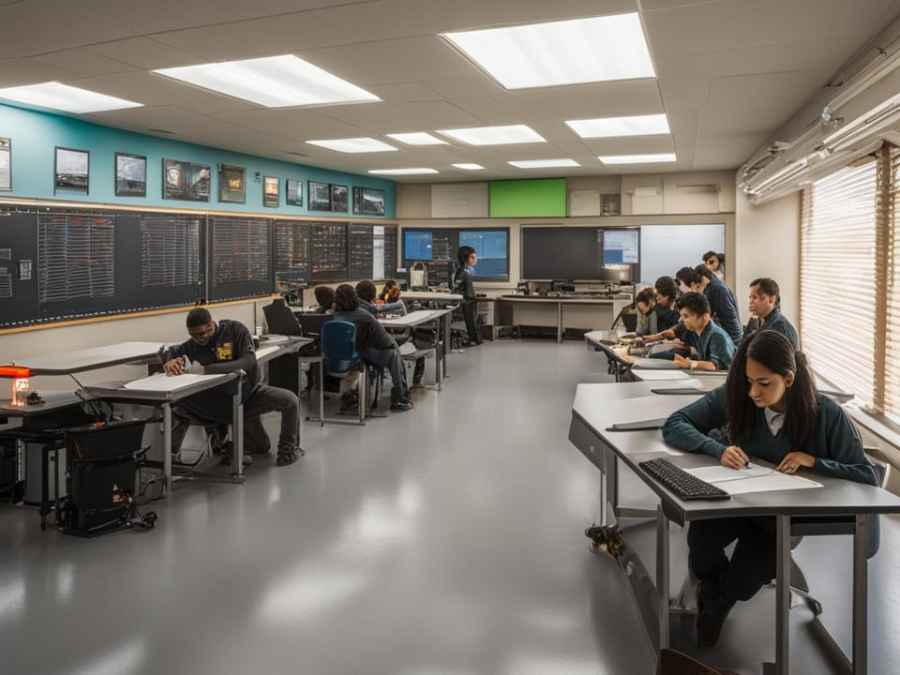The job market today is more competitive than ever, with employers seeking candidates with a diverse range of skills and experience. Career education and vocational training can help individuals acquire the technical skills needed to succeed in today’s workplace. Whether you are looking to gain new skills to advance in your current career path or explore new opportunities, career education offers a wide range of education options to choose from.
Vocational training programs provide hands-on training that prepares individuals for specific industries and occupations, while career education encompasses traditional educational routes, such as universities and colleges, as well as alternative options like online learning, apprenticeships, and trade schools. By pursuing career education and vocational training, individuals can enhance their career prospects and achieve career advancement.
Understanding Career Education
As the job market becomes increasingly competitive, having a solid educational background is more critical for career advancement than ever before. Career education equips individuals with the necessary skills and knowledge to pursue their desired profession successfully. But what exactly is career education?
Career education encompasses a wide range of post-secondary education options, including traditional college or university programs, vocational training, apprenticeships, and trade schools. The focus of career education is to provide individuals with the specific knowledge, skills, and abilities needed to excel in their chosen field.
Choosing the right education option is crucial for successful career advancement, and it is essential to make informed decisions about the type of education needed to achieve specific career goals. By gaining an in-depth understanding of what career education entails, individuals can make informed decisions about their futures and their education and training choices.
Exploring Education Options
Education options are plentiful in the United States, with various programs, institutions, and majors available to individuals. Choosing the right option can make all the difference in establishing a successful career. Traditional education options such as universities and colleges offer in-depth theoretical knowledge, while vocational training, apprenticeships, and trade schools provide hands-on practical training. Prospective students must explore and evaluate each option to find the best fit for their career goals.
“Education is the passport to the future, and tomorrow belongs to those who prepare for it today.” – Malcolm X
The Benefits of Vocational Training
Vocational training provides individuals with practical skills and hands-on experience, preparing them for specific occupations in high-demand industries. Unlike traditional education options, vocational training focuses on job-specific training that equips individuals with marketable skills and knowledge.
The benefits of vocational training are numerous. Firstly, it can lead to higher job placement rates and increased earning potential. In fact, according to the National Center for Education Statistics, individuals who complete vocational training programs have higher median earnings than those with only a high school diploma.
In addition to financial benefits, vocational training often leads to greater career satisfaction. This is because individuals receive training in areas where they have a genuine interest and passion, leading to a sense of fulfillment in their careers.
Finally, vocational training programs tend to be shorter in duration and more affordable than traditional education options, making them an accessible pathway for individuals seeking career advancement.
Overall, the benefits of vocational training make it a valuable option for individuals seeking to enhance their career prospects and achieve success in high-demand industries.
Developing Technical Skills
In today’s job market, having technical skills is crucial to achieving career success. As technology continues to evolve, it is imperative to stay updated and acquire new skills to remain competitive.
Technical skills refer to a broad range of abilities that relate to a specific industry or job function. These skills may vary from basic computer skills to advanced knowledge of programming languages, database management systems, or cybersecurity.
Investing in career education programs that focus on technical skills can open up new possibilities and provide a competitive edge when applying for jobs. Developing technical skills also boosts confidence in the workplace and can lead to higher job performance and potential for career advancement.
With the rapid pace of technological advancements, staying up-to-date with the latest trends and developments in the industry is essential. Pursuing ongoing training and development opportunities and regularly networking with peers and industry leaders can enhance technical skills and open doors to new career opportunities.
Exploring Education Options
When it comes to career education, there are various education options available, and it’s essential to explore them to determine the right path to follow. Traditional education routes like universities and colleges offer degree and certificate programs, which can lead to career advancement opportunities. However, with the advent of technology, numerous alternative options like online learning, apprenticeships, and trade schools have emerged, providing individuals with accessible and flexible ways to acquire a range of skills and knowledge.
Online learning offers the convenience of the virtual classroom, allowing learners to access quality education from anywhere at any time. In contrast, apprenticeships combine on-the-job training with classroom learning, providing hands-on experience and practical skills. Trade schools offer focused training on specific trades and technical skills, equipping learners with the practical knowledge needed to thrive in the job market.
It’s vital for individuals seeking career advancement to examine each of these education options thoroughly and identify which ones align with their goals and aspirations. Investing in education and training is crucial in today’s competitive job market, as it can provide the necessary skills and knowledge to excel in one’s chosen field.
Explore diverse education options to determine the right path for your career advancement.
Choosing the Right Career Path
Choosing the right career path can be daunting, but with the right guidance, it can be an exciting and fulfilling process. Career education can provide valuable resources to help individuals make informed decisions about their future careers. The first step in choosing a career path is to identify your interests and skills. Determine what motivates you, and what skills come naturally to you. It is also important to factor in market demand, as you want to ensure that your chosen career has good job prospects.
Researching in-demand industries and occupations is critical in determining feasible career paths. You may consider alternative education options, such as technical schools or apprenticeships, in order to gain the skills and knowledge needed to enter into a specific field. Career education programs can also be helpful in providing information about different careers and job opportunities.
Ultimately, choosing the right career path is about aligning your interests and skills with career options that offer opportunities for growth, financial stability, and personal fulfillment. With the right education and resources, you can take the first steps towards achieving the career of your dreams.
Navigating Career Education Programs
Choosing the right program is crucial to gaining the most from career education. Researching options is key, and there are a few factors to consider. Ensure that the program aligns with your career goals and interests. Investigate a program’s reputation and accreditation status.
Once you’ve determined a program of interest, the next step is to understand all the program requirements. This includes satisfactory academic progress, attendance policies, and any prerequisites or course requirements. It is also critical to ensure that you have the necessary computer hardware and software to participate in the program if the training is conducted online.
Financial aid and scholarships may be available that can assist with tuition costs. Information on these resources is often provided on the program’s website or through the financial aid office. It is recommended that you apply for these opportunities early, and don’t forget to complete the Free Application for Federal Student Aid (FAFSA).
Another valuable aspect of career education programs is the networking opportunities they present. Building relationships and connecting with instructors and fellow students is crucial to success in the field and can open up doors for potential job opportunities. Attend job fairs and industry events to expand your network and increase your exposure to potential employers.
“Career education programs are often intensive and time-sensitive. Properly navigating them can increase your chances of success, so it’s essential to do your research thoroughly and understand all the requirements to ensure you’re on track for graduation and success.”
Advancing Your Career with Career Education
One of the biggest advantages of pursuing a career education program is the potential for career advancement. These programs offer transferable skills that can enhance job prospects and increase earning potential. With advancement often comes higher salaries and greater job security, making career education a valuable investment in your future.
Career education programs also open doors to promotional opportunities. Employees who develop new skills and competencies through these programs can often take on higher-level positions within their organizations, or be considered for positions at other companies. For those looking to change careers, career education can provide the necessary skills and credentials to make a successful transition.
To take full advantage of career education, it’s important to identify high-growth industries and occupations that align with your career goals. With the right skills and credentials, you can position yourself as a valuable asset to prospective employers and advance your career to new heights.
“Career education has enabled me to take on new challenges and responsibilities in my job, and has opened up opportunities for me that I never thought possible.” – Jane Smith, career education graduate
Future Trends in Career Education
As the job market continues to evolve, so do the skills required to thrive in it. Career education needs to keep pace with these changes to ensure individuals are equipped with the technical skills needed to succeed. Some future trends in career education include:
- Technology-driven skills: With the increasing role of technology in all industries, technical skills such as programming, data analysis, and cybersecurity will become even more critical for career success.
- Soft skills: While technical skills are crucial, employers are also seeking soft skills such as communication, problem-solving, and adaptability. Career education programs will need to provide opportunities to develop these skills.
- Remote learning: The pandemic has accelerated the trend towards remote learning and online education. Career education programs will need to adapt to this shift and provide effective online learning experiences.
To succeed in the future job market, individuals must stay adaptable and continuously develop their technical and soft skills. Career education is the key to staying ahead of these trends and securing long-term career success.
Success Stories in Career Education
Choosing the path of career education and vocational training can be a transformational experience for many individuals. Here are some inspiring success stories that showcase the power of career education in advancing one’s professional journey.
John Doe: John Doe is a prime example of how career education can lead to career success. After deciding to switch careers and pursue a path in healthcare, John enrolled in a vocational training program to become a registered nurse. Through the program, he gained practical skills and hands-on experience that prepared him for his new career. Today, John is a respected healthcare professional and a role model within his community.
Jane Smith: Jane Smith had a passion for the culinary arts and wanted to turn her hobby into a career. After completing a vocational training program in culinary arts, Jane gained the technical skills and knowledge needed to launch her own catering business. Her business flourished, and today she is a successful entrepreneur with a loyal following of customers.
Adam Johnson: Adam Johnson had always been interested in technology and wanted to pursue a career in the field. Despite having no prior technical experience, Adam enrolled in a career education program in computer science. Through the program, he gained foundational knowledge and technical skills that allowed him to land his dream job as a software engineer. Today, Adam continues to hone his skills and stays up to date with the latest technological advancements in his field.
These success stories demonstrate the value of career education and vocational training in building rewarding and fulfilling careers. With the right education and training, individuals can acquire the technical skills and practical knowledge needed to succeed in their chosen professions.





